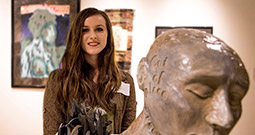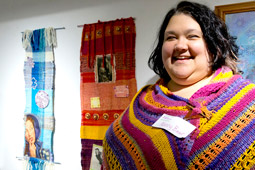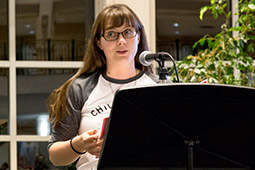University hosts Women of Appalachia Project showcasing female artists

Photographer: Kari Gunter-SeymourWest Virginia artist, Emalea Rupe, stands behind her piece “Words Hurt” at Ohio University Southern.
The Ohio University Multicultural Center is pleased to host the ninth annual Women of Appalachia Project (WOAP) Fine Art Exhibition and “Women Speak” performance featuring female artists living in or with strong ties to Appalachia from throughout West Virginia, Ohio, Kentucky, Virginia, Pennsylvania, Alabama, North Carolina, Florida and New Mexico.
A fine art opening reception will be held on Friday, Feb. 2, 5 to 8 p.m., with the spoken word performance (poetry, story and song) scheduled for April 21, 6 to 9 p.m. The fine art exhibit will be installed Jan. 16 through April 21.
According to the founder, Kari Gunter-Seymour Peterson, WOAP is unique in that it addresses discrimination directed at women from the many counties of Appalachia by encouraging submission of quality artworks from women artists (fine art and spoken word) of diverse backgrounds, ages and experiences, to come together, embrace the stereotype, show the whole woman; beyond the superficial factors people use to judge her. By creating an environment of camaraderie and self-esteem WOAP is able to recruit not only well-established talent, but also gifted emerging artists.
Along with Ohio University Multicultural Center Art Gallery, the spoken word and fine art of sixty-six women will be exhibited and performed at five other venues throughout West Virginia and Ohio: West Virginia University, Morgantown, West Virginia; Ohio University Southern, Ironton, Ohio; Parkersburg Art Center, Parkersburg, West Virginia; The Bowen House, Logan, Ohio; and a final exhibit and performance at The Pump House Fine Arts Center, Chillicothe, Ohio.
“Providing opportunities for females from the Appalachian region to exhibit their art, raw and unfiltered, allows us to openly celebrate our heritage and culture, throw open the doors, share our experiences and ideals, challenge the stereotype, says Gunter-Seymour Peterson.” We not only begin to build much needed self-esteem and empowerment within our female population, but also invite viewers to celebrate as well.”
When asked how living in Appalachia has influenced her life and therefore her art, West Virginia poet Anna Egan Smucker says, “Having grown up and lived most of my life in West Virginia, I’ve found that I need to be surrounded by trees and hills. I love to think there are places in the woods where no human has ever walked. Nature informs much of my work. It sustains me. More and more I see the need to protect our Appalachian mountains, hills, and our way of life rooted in this extraordinary place.”
"We are the forgotten,” says Ohio fine art photographer Whitney Folsom. “Appalachia, with all its great beauty and history, is a dark place. Gravitating heavily to origins and ritual, my work has always reflected prevalent symbolism and commonalities within the area, with an attempt to envelope the beauty within that darkness. The beauty in lineages of independence and survival when a nation gives up on you. As I have gotten older, I have realized my complete love for Home, and a deep sense of pride when asked where are you from? There is magic here, in the hills, and in its people, if you are ready to see it.”
The exhibit and events are free and open to the public. For more information go to www.womenofappalachia.com or visit WomenofAppalachiaProject on Facebook. For questions, email womenofappalachia@gmail.com

Photographer: Kari Gunter-SeymourAthens, Ohio, artist Nancy Baur, stands beside her hand-needled, mixed media pieces “Memory” and "Enjoy the Journey" at the Parkersburg Art Center.

Photographer: Kari Gunter-SeymourChillicothe, Ohio, storyteller Shea Daniels reads her piece, “Psychogeography” at Ohio University Southern.
